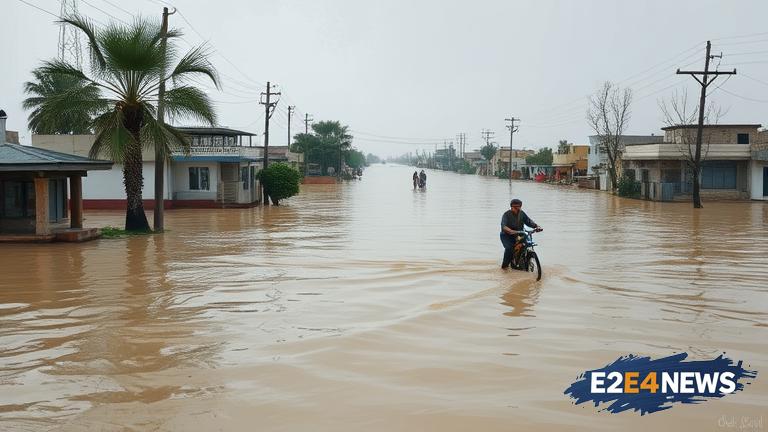Pakistan has been experiencing frequent and severe floods in recent years, with the most recent floods affecting over 33 million people and causing widespread destruction. The floods have sparked calls for the government to shift its focus from providing aid to affected communities to implementing adaptation strategies to mitigate the impact of future floods. Climate change is believed to be a major contributor to the increased frequency and severity of floods in Pakistan, with rising temperatures and changing precipitation patterns altering the country’s weather patterns. The government has been criticized for its slow response to the floods, with many affected communities complaining of a lack of support and resources. The floods have also highlighted the need for better infrastructure and planning, with many buildings and homes being constructed in flood-prone areas. The Pakistani government has announced plans to build new dams and water storage facilities to help control flooding, but many experts believe that more needs to be done to address the root causes of the problem. The international community has also been called upon to provide support and assistance to Pakistan, with many countries and organizations pledging aid and resources to help the affected communities. However, some experts argue that aid is not a long-term solution and that Pakistan needs to develop its own strategies for adapting to climate change. The country’s geography, with its mountainous terrain and extensive river system, makes it prone to flooding, and the government needs to take a more proactive approach to mitigating the impact of floods. This includes investing in flood-resistant infrastructure, implementing early warning systems, and providing education and training to communities on how to prepare for and respond to floods. The private sector also has a role to play in supporting the government’s efforts, with many companies and organizations providing resources and expertise to help affected communities. The floods have also had a significant impact on Pakistan’s economy, with the agricultural sector being particularly affected. The government has announced plans to provide support to farmers and agricultural communities, but many experts believe that more needs to be done to help the sector recover. The floods have also highlighted the need for better disaster risk reduction and management strategies, with many experts arguing that Pakistan needs to develop a more comprehensive approach to managing disasters. This includes investing in disaster risk reduction and management infrastructure, such as early warning systems and emergency response facilities. The government has also been called upon to provide more support to affected communities, including providing access to healthcare, education, and other essential services. The international community has a role to play in supporting Pakistan’s efforts to adapt to climate change, with many countries and organizations providing technical assistance and resources to help the country develop its capacity to respond to floods. The floods have also sparked a debate about the role of climate change in exacerbating the frequency and severity of floods in Pakistan, with many experts arguing that the country needs to take a more proactive approach to reducing its greenhouse gas emissions. The government has announced plans to increase its use of renewable energy and reduce its reliance on fossil fuels, but many experts believe that more needs to be done to address the root causes of climate change. The floods have also highlighted the need for better coordination and collaboration between different stakeholders, including the government, private sector, and civil society organizations. This includes developing more effective early warning systems, providing education and training to communities, and supporting the development of flood-resistant infrastructure. The government has also been called upon to provide more support to vulnerable communities, including women, children, and minority groups, who are often disproportionately affected by floods. The floods have also sparked a discussion about the need for more sustainable and equitable development in Pakistan, with many experts arguing that the country needs to prioritize the needs of its most vulnerable citizens. The government has announced plans to develop a new national disaster risk reduction and management policy, which will provide a framework for responding to and managing disasters. The policy will include provisions for early warning systems, emergency response facilities, and support for affected communities. The government has also been called upon to provide more transparency and accountability in its response to floods, with many experts arguing that the country needs to develop more effective mechanisms for monitoring and evaluating its disaster risk reduction and management efforts.
